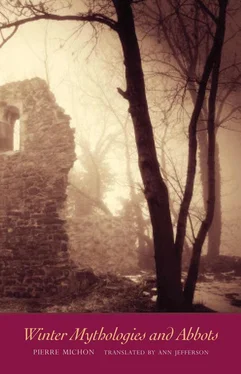The drizzle persists all morning. The animals have gaiters of mud right up their legs, as heavy as they. Around noon, an ox on the right-hand side of the third team collapses, and on the left-hand side the lead ox, exasperated by this resistance, bellows and charges. Hugues, who jumped to the wrong side, the left, takes the charge full in the chest; he falls, five standing oxen and one slumped ox trample across his body, and finally thirteen inches of iron slice his body in two.
It’s the first death since the monastery has been restored. A hole has been dug in the old cemetery, which dates from the time of Philibert — a few bones from the time of Philibert have briefly seen the light of day again. Hugues arrives in the white shroud; the monks have piously washed and anointed what remained and disentangled the bones from the mud. They have placed a plank of wood inside the shroud so that the two pieces look like one. The sun has returned. He is laid in the earth; his beautiful throbbing voice will never again be heard. The shrill bells all ring out, the beautiful confident voices all sing, and, deep inside, each voice hears the voice that throbbed and is dead. Bishop Benoît without miter or cowl sings among them as if he were one of them. Then the seagulls can be heard: Èble slowly steps forward without miter or hood, pronounces the prayer of absolution for the dead. The vast red twilight shines through the white towhead; he looks like a saint.
The fishermen on the barges leave to set up the nets for the night catch.
Next to the bishop at the guest table, the abbot’s place is empty. He is not seen either at Compline.
He has been walking in the old cemetery where Hugues’s fresh cross is all there is. Once the barges have left, he is inside the hut. A body, or the earth in its entirety, bares itself up to the waist in the dark. In the dark a plow slices a man in two, a manat-arms expires in a slow death agony, a brother kills his fellow brothers. The world is gathered in a wound of wet fire, and this world can be joined and then disjoined at will. Shifted thus the world cries out and exults. The abbot cries out and exults. He returns to the cemetery, where the moon has risen. He prays for Hugues before the tiny new cross, he laughs and weeps, and once again he hurries to the hut. He leaves only when he hears the voices of the fishermen. As he leaves, he passes the husband on the doorstep. For a moment they look at each other in the moonlight, then each goes where he must.
He wakes the bishop. Benoît lights the little oil lamp, puts on his stole, makes the sign of salvation over the other man, sits and listens while Èble kneels and speaks. He painstakingly confesses what he knows. He weeps frequently; he talks about Hugues’s throbbing voice, about Guillaume whom he loved, about pleasure, and about the things you don’t want to share. When he is finished the bishop absolves him with the customary penances. He tells him that the flesh is evil, which they both know, and that it is the lesser evil. He tells him that the lead ox on the third team is not called Èble; it is one of God’s creatures and endowed with freedom. He tells him that the first blood to be spilled consecrates a piece of land. He tells him that glory — the glory of having expanded Saint-Martial in Limoges, of having established fiefdoms on the fires lit by his brother, of having restored to God a hundred acres of land reclaimed from the Chaos and the Void — has already overlaid his infamy with gold, just as the glebe will tomorrow overlay the blood of Hugues. He tells him to rise; he kisses his hands.
In the middle of October, when the fishermen are piled into the barges with their cattle and their children to return to their islands, the woman is pregnant. As she leaves she very quickly kisses the abbot’s hand; she smiles at him.

All winter long the monks maintain the ditches and fortify the embankment. The reclaimed land remains as land on which the rains trickle down without eroding it. In the spring there is grass growing on it. The monks beam with delight and cavort about on it; they speak of miracles and agronomy. Èble laughs too. Saint George gallops in the meadow; a woman awaits him behind a dragon. The cattle are put out to graze on it. When the days lengthen in May, the barges arrive with their freight of rain worshipers who have come to serve God. Some have died or are occupied elsewhere, but there is a greater number of new arms. The woman from Champagné is not there.
Nor does she return in the following summers. The monks reclaim a hundred acres each season, and now after the plowings on the oldest land-takes they are growing beans and corn. The place where Hugues died remains a meadow, and Èble thinks he sees that in the spot where blood was spilled the grass is thicker. The twilights are vast and red, or sink, modest and damp, in the drizzle. The monks now have great deep bells which have come by water from Limoges, engraved around the rim: Benoît, bishop, to Èble, abbot . Storms sometimes pass overhead, the blue lightning bolt shatters the great raised arms of the plows. None of this is of concern anymore to Èble. He spends hours just sitting, in the chapter house or the cloister, on the grass in the meadow. He leaves the prior to take on the business of allocating the tasks, of being proud of successes, or of weeping over failures. The towhead fades, memory grows weary, it can no longer disentangle Hugues from Benoît, or Guillaume, or Denis who arrived two or three years ago and whose throbbing voice drowns out the others. It can no longer disentangle the woman of the marshes from the viscountess of Chalus, Adélaïde, or Mathilde, who were once avid and penitent, all of them pierced by the lightning bolt, stripped bare, marked by a wound and by cries. All these figures join hands and dance before him, couple and kill each other, embrace. All things are mutable and close to uncertain. Sometimes he gives a solitary and mostly cheerful little laugh: he is thinking about glory, and that draining lands is like blessing crowds with the purple ring. It is undoubtedly glory, but all these things are very precarious candles which are quickly covered by the bushel and then lit elsewhere. The red twilight does not move; everyone knows where it is lit without changing, and at the root of this unchanging glory there is no man, living or dead. Èble is on good terms with the death that is on its way; it is written into the round of life, and it is not glorious.
He walks down to the harbor. It’s the dead season of Christmas, when the fishermen bring barrels of herring and the finest fish — sturgeon and pike — for the table at Epiphany. The winter morning will be very blue; it’s already blue, but a few patches of mist are still traveling across the water. Out of the mist, heading straight toward him, a flat-bottomed boat emerges in which plump fish gleam. In the prow of the boat there stands a small, fair-skinned girl with a head of tow, a thousand densely packed sunbeams, gold that shines against the silver of the pikes. She bears the torch of daybreak. The sun exists for this brilliance, the blue belongs to her. It looks like a crown. It looks like something else which Èble knows well and which is not himself or his brother Guillaume. The abbot thinks very quickly, and what comes to mind is the word glory .
The little waves slap against the boat, the seagulls make their usual complaint about the world, the word glory is borne directly to Èble.
The boat docks; in the stern with his pole he recognizes the man from Champagné. The little girl jumps onto land, very quickly kisses the abbot’s hand as she has been told, picks up the big fish and throws them into the baskets. What brilliance. Her tiny bare feet are firmly planted on the white stone. The gold straw covers her eyes, and sometimes a little hand impatiently pushes her hair aside. The abbot and the man look at each other, like the other time. His beard is turning gray now, and he looks like Saint Joseph. “Is this your daughter?” says the abbot. The man replies with a resolute Yes, and that they have had three other children since. The baskets are full; the little girl leaps like a flame; she is in the boat, in the mist, the blue completely envelops a black monk among the baskets of sturgeon.
Читать дальше












